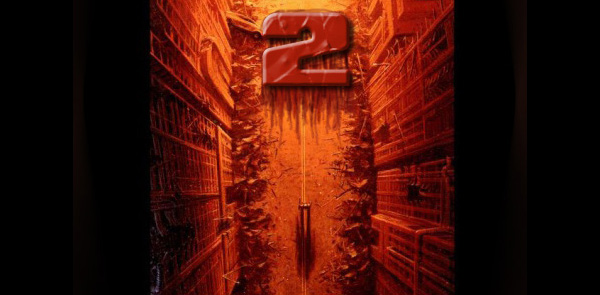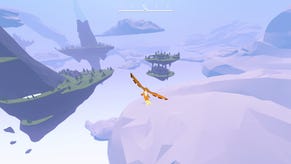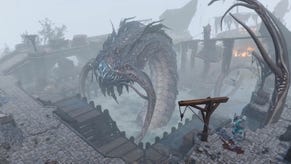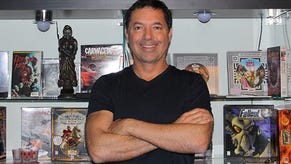Interview: Obsidian's Chris Avellone on Wasteland 2
Rabbit is reduced to a thin red paste
It's happening. An astounding $2.1 million later, Obsidian Entertainment is getting the Black Isle band back together with Brian Fargo to make Wasteland 2. It's like some kind of Cinderella fairytale comeback story, only everyone dies in a radioactive pain puddle at the end. Or the beginning, really. But anyway, happier things! Shortly before the big news broke, I had a chat with Obsidian chief creative officer Chris Avellone about what sort of hand he and his team of burly brained wordsmiths will have in the game. Also, Kickstarter, nostalgia, and bugs and glitches - because those are sort of a thing for the Fallout: New Vegas, Alpha Protocol, and Dungeon Siege III developer.
RPS: How did the Wasteland deal come about? Did it start with that much-publicized Ripten interview, or were the wheels in motion beforehand?
Chris Avellone: Wheels were in motion beforehand, we just couldn’t say anything publicly. Brian approached me, then Feargus, and we all worked something out. My motivation? I just wanted to work on it.

RPS: In the basically inevitable event that Wasteland raises $2.1 million [Hey, look - I was right!], how will Obsidian fit into the picture? What will you personally be doing? How much of Obsidian will be involved, and in what role? How will revenues be split? What sort of game do you envision it becoming?
Chris Avellone: It’s up to the goals of the project. Brian’s leading the charge on that. I’ll be the one from Obsidian contributing, and as such, most likely in area/narrative design capacity. In addition, we’d be sharing our knowledge of conversation tree mechanics and layouts with InXile to make conversations in the game as good as they can be. We’ve had a lot of victories over the years that we’ve incorporated into our designs, and we’re eager to share them to make Wasteland 2 even better.
Furthermore, if there's elements of the tools or other functionality that might help with Wasteland, we'd be looking into those aspects and sharing that knowledge as well (Here's how we structure dialogue systems, here's how we've set up the tools and editors to do X, Y, and Z, here's some things that aid with script tracking reactivity, etc, etc).
Ultimately, it's still early and we won't know the logistics for a short while longer, but we'll keep folks updated. Right now, we're definitely on board in a design capacity, which is one of Obsidian's strengths.

RPS: Recently, word got out that Fallout: New Vegas missed its Metacritic goal by one point. What do you take away from that, though? What parts of the developer-publisher model, in your opinion, need fixing? On general terms, where do things break down?
Chris Avellone: At most places where every other pipeline breaks down – money and resources. And to be fair, they don’t always break down at all. There’s plenty of instances where having the larger backing and the larger resources ends up being a plus – if a game is delayed or needs more resources, more quality assurance, an extra month or two to cook, some help with middleware, etc. The publisher can often get those resources. It’s their choice if they want to make the expenditure. Overall, having to answer to someone holding the purse strings on all fronts is something that’s going to be similar across models, although I prefer players paying directly for content and removing the middle man.
RPS: That in mind, then, is Kickstarter just what the industry needs? Something that gives developers options beyond the traditional developer-publisher model?
Chris Avellone: I’d argue Kickstarter isn’t what the industry needs, it’s what players need. Who’s to say “dead genres” are dead? Are they? Who made this decision? And worse, who decides that those games won’t be financed? Publishers have every right to watch their bottom line, but for a long period of time, that was largely the only financial model developers had – and the only way most players were going to see games get produced.
Kickstarter changes that, and asks the players what they want. You’re not asking a publisher about an R.O.I. You’re asking players if they’d pay to see a genre they love be produced. It’s voting, it’s targeted people directly. It’s a fresh perspective, and I think it’s a great agent for change for games that often wouldn’t make it past a publisher pitch stage – adventure games, for example. As such, assuming there’s a demand, and there is, then suddenly you’re able to meet that demand. Sounds like everyone wins. Publishers don’t have to worry about returns, and developers have an outlet for their games.
Not to say the traditional model should be discounted. It’s a different beast with different expectations, and there’s definitely a core audience that supports it. Comparing the two models, I don’t feel Kickstarter is at the level yet where it could fund an Uncharted 4 or the latest Call of Duty with the same production values, for example, but those two titles are still something the public will want that only a publisher can deliver on.
I do feel that when Double Fine achieved the success it did, a number of business development and managers in the game industry took note. While it may not change their practices, it was significant enough for them to take notice.
Personally, the arena outside of gaming interested me as well. My girlfriend summed it up simply by saying, “I wish they’d do a Kickstarter to resurrect Firefly.” If money’s the only object, then possibilities like that begin to come to mind, which I find very exciting. As much as people would pay for adventure games, think how many people would donate to Nathan Fillion or Joss Whedon to take back Firefly. I’d pay a LOT.

RPS: Do you think Kickstarter games will continue being able to achieve multi-million dollar success stories? Do you think Wasteland and Double Fine Adventure are the first of many, or are they exceptions to a system that, in truth, has been funding smaller indie games for a couple years? Do you think Brian's Kick It Forward idea stands to push things in the former direction?
Chris Avellone: Yes, but not consistently. I feel Kick It Forward is a great model to keep the frequency more in the “yes” direction.
RPS: How much of a role do you think fans should have in the decision-making process on games they've funded? How much do you think they have a right to know -- if any? Are you worried that this could compromise artistic integrity? Or do traditional standards of artistic integrity as defined by books, film, etc not apply to games?
Chris Avellone: We already have to be aware and meet player expectations in the industry already – it’s our job and our responsibility. Having fan input earlier on helps you do both, and makes it more relevant. I think the fact developers are forced to distance aspects of their game and its features from the public from the outset as part of the current model is a strike against it. To use our example from FNV: Old World Blues, a lot of the strength of that DLC came from fan feedback, ranging from inadvertent (hey, there sure are a lot of homebase mods on the Nexus) to purposeful (open world structure, humor).
On art - I feel games can be art. I want games I work on to be fun and entertain first, with art being second, but I’m going to shoot for both and have always tried to do so. I feel that players also want this, and they’ll support efforts in that direction.

RPS: The whole "getting Black Isle back together" news story set off a chain reaction of nostalgic comments, tweets, Facebook posts, and probably a few extremely meme-able YouTube videos. Meanwhile, Baldur's Gate is coming back via Beamdog. There's this giant contingent of RPG fans who constantly pine for the "golden age" to return, and now they're getting their wish. Is that a good thing, though? Or is there a risk of pushing the genre backward -- looking back without moving forward?
Chris Avellone: It depends what you mean by “backwards.” I still consider a lot of innovations that occurred with Fallout 1 and Wasteland to be unmatched in today’s RPGs. I feel true innovation often gets lost beyond features that require new engine tech and the latest video card when we can achieve more interesting game mechanics in tighter constraints.
I don’t think anything involving Kickstarter would stop future RPG iteration across the major franchises in the slightest. There’s still a market for those huge budget RPGs that people want, and they’re fun to play, so no harm there. I also don’t see the harm in the industry going “backwards” and forwards – again, I think there’s a lot of gameplay elements that can be learned from working on “old school” titles that are just as applicable in current titles and can push both genres forward.
RPS: Do you think Kickstarter is at risk of becoming a tool for resurrecting much-beloved series and genres that have been collecting dust? Do you worry that gamers are -- at heart -- just as risk-averse with their money as publishers?
Chris Avellone: Not after Double-Fine and InXile’s Kickstarter efforts. The response we got at Obsidian for a Kickstarter was 1000 hits/sec on our website followed by a flood of support. I’m not worried.

RPS: Speaking of that, will you still go forward with your own Kickstarter if the Wasteland Kickstarter passes $2.1 million? Do you have a planned start date for it yet? Or is it just an idea right now?
Chris Avellone: Yep, always in the cards. Our hope with Wasteland 2 is three-fold: First up, we want to support this publishing model. After being in the industry for over 16 years, the Double Fine foray into Kickstarter feels like a change for the better. Suddenly there was absolute proof that people do want adventure games just like I do, and they’re willing to support them. Same thing with Wasteland – there is a market for old-school turn based RPGs I love, and people will support that as well. There’s no way to get a publisher to bite on a pitch like that. You’ll lucky if they’re even listening after the first sentence.
We also plan to learn from Brian’s efforts. Brian positioned himself strongly in the Kickstarter model, made a lot of smart decisions, and he’s going further, by advocating it not just as a model for his game, but working to make it more industry standard. I want to support this, be involved with this, and learn from it. Wasteland 1 is in my top 10 games of all time. If I could travel back in time and tell younger Chris he’d have a shot at it, I probably wouldn’t be here today because he would be dead of a heart attack.
Also, Brian’s been really supportive of other Kickstarter projects, and he’s been great with us on this. My hope is that when we toss our hat in the ring, Brian would be willing to help us out, and I don’t doubt he will based on his actions with the community already.
RPS: Recently, Obsidian had to lay off a large number of people, which was absolutely devastating to hear about. Can you discuss, at all, the circumstances behind that? How many projects is Obsidian working on at this point?
Chris Avellone: A project was suddenly canceled. It happens in the industry – in this case, it affected a large number of employees. We’re working hard at finding them jobs, and friends and developers in other companies also were great in coming forward and helping us out, so many thanks to them. We’re still working on two projects: South Park, and a team focused on pitching our second project that we put on hold for North Carolina.

RPS: I've seen an interesting trend in fan responses to the Wasteland-Obsidian probable partnership: "YES, IT'LL BE JUST LIKE FALLOUT 2." Except that Wasteland and Fallout 2 are very different games -- especially in terms of battle system, etc. How do you cater to Wasteland fans and Fallout fans while also making something that gamers who've never experienced either will dig?
Chris Avellone: I don’t think “modern gamers” want Wasteland 2. I think the people that remember and played these games want the Fallout 2/Wasteland experience which is a different target audience. Now, you could argue that they still don’t know that they want that and that they may have unconsciously become used to modern game mechanics or features like voice-acting.
Still, I have faith they don’t need the more expensive trappings that I often feel can hinder the experience as much as it potentially helps it. It may be the section of fans I interact with, but all of them are old-school turn-based RPG lovers, and they know what they’re getting into.
Lastly, this is my opinion: it’s Wasteland 2. It should be a Wasteland game. While there were differences between F2 and WL, there’s a lot of similarities as well: open world, open exploration, skill-based solutions, stat-based solutions, enemy types, coping with radiation, etc. I’ll be honest, we worked at playing around with Wasteland elements in Old World Blues, and people never felt the difference – they loved it all the more for those elements.
RPS: Obsidian has kind of a dubious reputation for glitchiness in games, but Dungeon Siege III was pretty stable. Have you finally exterminated your bug problem? If so, what's changed?
Chris Avellone: That’s a good question, and Dungeon Siege III is a good answer to it. Dungeon Siege III was developed internally. We had the tools team a few doors down, our tools guys understand why we ask for functionality in the editors, and Onyx was set up to do what Dungeon Siege III’s mechanics required. From a narrative standpoint, scripting a conversation in “Obsidian style” for DS3 took far less effort than any other game we’ve worked on, including our own Black Isle titles. Also, I feel Square was encouraging with Quality Assurance, and we had time and support to address issues as they came up. I feel Treasures of the Sun, the DLC, also makes the core game even better. All of these factored into development, and it shows if you found the game a stable, fun experience – that’s every developer’s goal and no developer I know of sets out to ever do anything less.
RPS: Alpha Protocol 2. Please? Somehow? Kickstarter? I'll totally fund it with my sexy, sexy games journalist money. How far will a month-old brick of ramen and a leftover Canadian five dollar bill get you?
Chris Avellone: We would love to work on an Alpha Protocol 2. We had a lot of high hopes for the sequel. SEGA owns the IP, however, so a true sequel would be unlikely. A spiritual successor using what we’ve learned and what more we wanted to do in that world – both narrative and game mechanic-wise – would be pretty exciting. Still, doing an AP2 would be an expensive prospect, so Kickstarter may not be the avenue for that at this time. We'll see.








